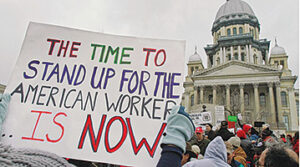Other state legislatures should seize the moment to advance worker, racial, and gender justice in 2023
By JENNIFER SHERER
Economic Policy Institute
 On election day, Illinois voters approved a constitutional amendment guaranteeing all workers organizing and collective bargaining rights, setting a new high bar for state labor policy at a moment when policymakers should prioritize empowering workers to address historic levels of income inequality and unequal power in our economy.
On election day, Illinois voters approved a constitutional amendment guaranteeing all workers organizing and collective bargaining rights, setting a new high bar for state labor policy at a moment when policymakers should prioritize empowering workers to address historic levels of income inequality and unequal power in our economy.
The Illinois Workers’ Rights Amendment adds language to the state constitution affirming that “employees shall have the fundamental right to organize and to bargain collectively through representatives of their own choosing for the purpose of negotiating wages, hours, and working conditions, and to protect their economic welfare and safety at work.” The new clause also specifies that “no law shall be passed that interferes with, negates, or diminishes the right of employees to organize and bargain collectively.”
The amendment’s expansive language creates a legal backstop against two persistent lines of state legislative attack on U.S. workers’ basic rights to unionize:
- Threats to repeal or erode public-sector workers’ collective bargaining rights.
- Threats to constrain private-sector workers’ collective bargaining rights with so-called “right-to-work” (RTW) restrictions.
Such restrictions prohibit unions and employers from negotiating union security agreements into union contracts.
Just as importantly, the Illinois Workers’ Rights Amendment opens up promising new pathways for additional groups of long-excluded workers to unionize and pursue collective bargaining with their employers.
FOLLOW ILLINOIS’ EXAMPLE
Heading into 2023, state legislators in the Midwest and across the country should follow Illinois’ example by restoring workers’ rights after a decade under threat from extreme anti-union state legislation that has already suppressed wages and eroded job quality in many states. Long-overdue action to remove existing restrictions and affirmatively extend union rights to all workers is a first, essential policy step states can take to reverse growing inequality and end long-standing racist and sexist occupational exclusions in existing Labor law.
Ensuring full bargaining rights to all workers requires state action because of gaps, weaknesses, and racist exclusions in federal law
Federal law protects bargaining rights of most private-sector workers through the National Labor Relations Act (NLRA). Yet, states continue to play centrally important roles in shaping worker power both because occupational carveouts in federal Labor law leave millions without union rights unless states act, and because even for workers who are covered under the NLRA, Congress has long allowed states to constrain (but not expand) bargaining rights through so-called “right-to-work” (RTW) laws.
 The NLRA excludes public-sector, agricultural, and domestic workers from coverage, as well as supervisors and independent contractors, leaving states to set policy on union and collective bargaining rights for these occupations. As a result, collective bargaining rights for various types of public employees vary widely both across and within states, while farmworkers and domestic workers (including millions of direct home care and child care workers) continue to lack collective bargaining rights in all but a few contexts.
The NLRA excludes public-sector, agricultural, and domestic workers from coverage, as well as supervisors and independent contractors, leaving states to set policy on union and collective bargaining rights for these occupations. As a result, collective bargaining rights for various types of public employees vary widely both across and within states, while farmworkers and domestic workers (including millions of direct home care and child care workers) continue to lack collective bargaining rights in all but a few contexts.
These gaps, weaknesses, and exclusions in U.S. Labor law are rooted in racism and perpetuate economic, racial, and gender inequality. Following the passage of the NLRA, anti-union, explicitly white supremacist campaigns to limit worker power and maintain Jim Crow labor relations focused on state legislation as a means to constrain union rights via RTW policies, initially in Southern and Western states. These restrictions on collective bargaining rights have since spread to 27 states, and are themselves enshrined in nine states’ constitutions (now including Tennessee, where voters approved a new constitutional amendment on election day 2022).
AFFIRMS COLLECTIVE BARGAINING
Illinois’ broadly worded new Workers’ Rights Amendment both affirms the collective bargaining rights of all employees, regardless of occupation or sector, and explicitly prohibits RTW-style legislation that limits bargaining rights. Every progressive state policymaker’s agenda in 2023 should start with taking similar steps to put an end to Labor law’s existing gaps and exclusions by guaranteeing full union rights for all workers, regardless of occupation, race, gender, or geography.
 State worker power policies that guarantee workers’ collective bargaining rights should be considered top priorities for legislators because they are fundamentally linked to economic and labor market outcomes.
State worker power policies that guarantee workers’ collective bargaining rights should be considered top priorities for legislators because they are fundamentally linked to economic and labor market outcomes.
Workers in states with stronger collective bargaining rights and higher union density tend to have higher wages than their counterparts in states with weak public-sector bargaining rights or RTW restrictions on private-sector bargaining.
Proponents of the Workers’ Rights Amendment pointed out that Illinois workers earn higher wages on average and are also five percent more likely to have health insurance coverage and 32 percent less likely to die on the job than counterparts in states that constrain collective bargaining rights. Moreover, unions reduce income inequality across the economy, counteract racial and gender labor market inequities, and reduce public-sector pay gaps.
MIDWEST FIGHTS OVER WORKER POWER
The Workers’ Rights Amendment victory marks a decisive response and a potential turning point after over a decade of attacks on workers in Midwestern states where, following the 2010 midterm elections, newly elected Republican governors and legislative majorities prioritized extreme anti-union legislation and litigation.
EPI analysis at the time documented a clear pattern of cookie-cutter, anti-union bills introduced in multiple state legislatures and driven largely by politics rather than economics.
Backed by a network of wealthy individuals and corporate-backed lobby groups including the Chamber of Commerce, National Association of Manufacturers, Americans for Prosperity, and the American Legislative Exchange Council (ALEC), these state legislative attacks focused on undermining worker power in both the public and the private sector.
In 2011, newly elected Wisconsin Governor Scott Walker championed passage of Act 10, legislation designed to severely limit public employee collective bargaining rights in a state that had for decades had a strong statutory framework in place obligating public employers to bargain in good faith with employee unions.
Act 10’s sweeping changes nullified existing public-sector collective bargaining agreements across the state and stripped away decades of bargaining history. Among other changes, Act 10 prohibited negotiations on any subject other than base wages (while capping negotiated increases at the rate of inflation), outlawed fair share fees or payroll deduction of union dues, and required unions to hold a new election each year in order to maintain legal certification.
Within the next two years, Republican statehouse majorities in states including Ohio, Indiana, Michigan also passed legislation to substantially restrict or prohibit collective bargaining rights of public-sector workers.
Ohio voters were able to quickly restore public-sector bargaining rights via a 2011 ballot initiative, but major new constraints on bargaining rights remain in place in multiple other states. A decade after passage, laws like Wisconsin’s Act 10 are showing devastating impacts on worker wages, union density, and public education.
In 2017–2018, a second wave of newly elected Republican majorities in Illinois’ neighbor states of Iowa and Missouri took steps to limit the rights of public-sector workers, including unprecedented sweeping changes to state collective bargaining law in Iowa that emulated much of Wisconsin’s Act 10.
Throughout this period, the same constellation of corporate-backed lobby groups waged a patterned attack on private-sector workers’ rights by pushing for as many states as possible to repeal state prevailing wage laws and pass so-called “right-to-work” (RTW) legislation. In 2010, among Illinois’ five neighboring states, only Iowa had a RTW law on the books (dating back to 1947). In 2011–2012, 19 states introduced RTW legislation, and both Indiana and Michigan passed RTW laws in 2012. Within the next five years, Republican-majority legislatures in Kentucky, Missouri, West Virginia, and Wisconsin all passed RTW laws.
By decade’s end, Illinois was surrounded on all sides by RTW states with the exception of Missouri, where voters restored full bargaining rights for covered private-sector workers by repealing the state’s new RTW law via a 2018 ballot initiative.
Meanwhile in Illinois, anti-union attacks during this same period included changes to state law limiting teachers’ right to strike, litigation that led to a major U.S. Supreme Court decision limiting public employee bargaining rights across the country, and attempts to pass local RTW ordinances.
JANUS V. AFSCME
When Republican Bruce Rauner was elected Illinois governor in 2014, he prioritized similar anti-union attacks, starting with an executive order aimed at invalidating public-sector union contract language on non-member “fair share” fees and a lawsuit claiming such contractual agreements were unconstitutional. Rauner’s lawsuit became Janus v. AFSCME, a notorious case that corporate-backed, right-wing legal foundations supported all the way to the U.S. Supreme Court. In a 5-4 decision, the Supreme Court overturned decades of Labor law precedent in a ruling that barred public employees and employers across the country from negotiating agreements on payment of agency or “fair share” fees.
Rauner simultaneously encouraged Illinois cities and counties to create what he perversely called “employee empowerment zones” via local ordinances intended to invalidate union security language in private-sector union contracts, attempting to impose RTW conditions on private-sector unions and employers at the local level. The single local RTW ordinance adopted in Illinois was later struck down in federal court, but the persistent and cumulative threats to union bargaining rights hit home for public- and private-sector workers across the state.
Illinoisans who championed this year’s Workers’ Rights Amendment appealed to voters with reminders that without constitutional protection, similar threats to basic rights could easily recur in the future.
State Senator and amendment sponsor Ram Villivalam said he was motivated to provide “stability and certainty” to Illinois workers because, even if RTW legislation is not a current threat, “future politicians can be different than the ones we have today.” State labor leaders said the U.S. Supreme Court’s recent Dobbs decision on abortion rights also became a factor, as a stark reminder to voters of how easily even long-standing, fundamental rights can be taken away.
(Read the full report at https://www.epi.org/blog.)

